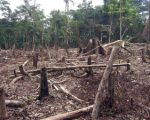
The Natural Capital Protocol, which is mainly aimed at business users, could potentially transform the way businesses operate because it comprehensively demonstrates how companies are dependent on a healthy environment. In my opinion for the Protocol to be considered successful it also has to transform the business model and reduce the impact of those economic sectors that have a hugely negative effect on the environment. Can an oil or mining company reduce the footprint of their business activity, change where they operate or change the products they sell?

Do you know how to measure the value of the fresh water you drink every day or the carbon dioxide captured by the Amazon rainforest? If nature is going to be valued across the world who should do it: accountants, governments, companies or communities?

What were the key debates at the heart of the process to agree on the Sustainable Development Goals (SDGs)? Central areas of contention included how to interpret the universal nature of the SDGs and who will fund their implementation.

Has the time come for economic valuation of ecosystems or will this weaken conservation by commodifying nature? Who values nature could be crucial to what happens after valuation.

The first major international conference on natural capital has increased understanding of our dependence on the environment but more research is needed on social issues.

An increasing number of governments and institutions including the World Bank are backing the valuation of natural capital. They argue nature needs an economic value to ensure it is protected. But there is fierce criticism against ‘pricing nature’ and questions over valuation methodologies. If natural capital is adopted internationally it could be a key pillar of the emerging green economy.






